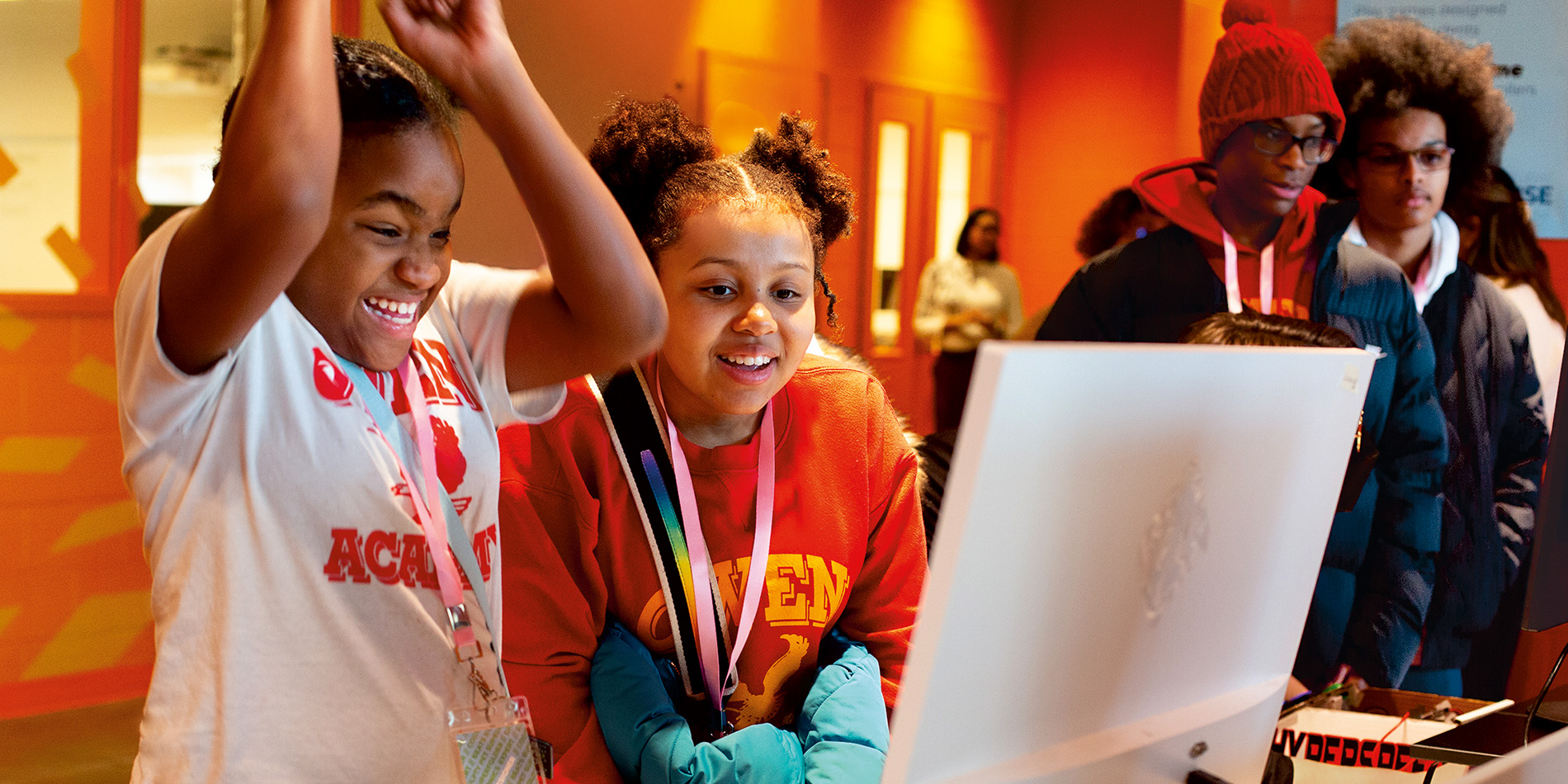GEARS Gadgets and Game-Changing Learning
Chicago middle school students explored virtual welding, robotics, and more at the FUSE Futures celebration of science, technology, engineering, arts, and math programs and career paths at Richard J. Daley College.
The seventh- and eighth-grade students, who participate in FUSE through grants from Boeing, rotated through stations including laser cutters, programmed robotic arms, and Daley’s virtual welding machine.
FUSE is a hands-on, choice-based learning environment that has been in Chicago-area schools for more than a decade and has now spread to 20 states. Students work on challenges that “level up” like those in video games. In the Boeing Design to Fly Challenge, which FUSE devised with Boeing engineers, students designed and refined custom controllers for a flight simulator.
Mentors from Boeing then demonstrated “flying” using some of the student-designed devices. “Giving kids choice and freedom based on their own interests can create a really lively classroom culture of peer learning and teaching,” says FUSE founder and learning sciences professor Reed Stevens. “Students truly enjoy working and learning together.”
OpenSciEd and Northwestern Launch High School Chemistry Course
In one unit of a new high school chemistry course from OpenSciEd, slow-motion videos of lightning help students explore what causes such strikes and why some structures are safer than others in a storm.
“Our goal at OpenSciEd is to open up science to all students,” says Brian Reiser, SESP’s Orrington Lunt Professor of Learning Sciences. “We want students to see science as relevant to their lives and communities.” OpenSciEd develops free, high-quality science curricula aligned with the Next Generation Science Standards.
The new chemistry course integrates earth and space science and was created in partnership with Reiser’s Next Generation Science Storylines project, the University of Colorado Boulder, and teachers nationwide. Each unit starts with real-world phenomena that drive student questions. In the lightning unit, students investigate molecular interactions and energy transfer. Other units examine global issues such as sea-level rise and sustainable resources. Learn more and find free materials at openscied.org.
Pinkard, Tipton Named to National Academy
Nichole Pinkard, Alice Hamilton Professor of Learning Sciences, was among 22 exceptional scholars elected to the prestigious National Academy of Education. Also elected was Beth Tipton, who holds a courtesy SESP appointment as professor of human development and social policy and codirects Northwestern’s Statistics for Evidence-Based Policy and Practice Center.
Pinkard is the 18th SESP faculty member to join the academy. A quality her friends and colleagues especially love is her ability to bring out the best in everyone. “I picture her up at 5 a.m. thinking, ‘How can I get this person—who I think has so much unrecognized potential—into a better position?” says Michael Horn, associate professor of learning sciences and computer science.
“‘How can we move this other person so that she can thrive?’ She sees the value in people. Then she amplifies it in a way I’ve never seen anyone else do.”
Global Practicum Program Expands
Beginning this summer, undergraduate students can complete their practicum through the Global Engagement Studies Institute (GESI) study abroad program, giving the practicum a more global reach.
In addition to GESI options—including programs in South America and Asia—undergraduates can study in Sydney, Milan, or Dublin as part of SESP’s Global Practicum Abroad offerings.
Both GESI and Global Practicum Abroad allow students to fulfill practicum and global experience requirements concurrently. Students who choose GESI work with small groups, which are paired with NGOs.
In Sydney, Milan, and Dublin, students are individually matched with organizations.
Integrating Social Justice into Organizational Change
An innovative digital anthology project led by SESP’s Kimberly Scott explores how social justice principles can be woven into organizational change. Scott describes the expansive online Social Justice in Organizational Change initiative as an “experiment with intellectual activism.”
To date, 40 people have contributed. Edited by Scott, the anthology features work from several alumni, faculty, and coaches affiliated with the Master of Science in Learning and Organizational Change program, including Dorie Blesoff, Nicole Dessain, Sonya Kaleel, and Ngoc Nguyen.
The resource is continually expanding, and new contributors are welcome. Scott, assistant professor of learning and organizational change and associate dean, is integrating its content into a graduate course she coteaches, Exploring Sustainable Development for Organizations.
“It’s a collective effort to learn together,” she says. “We’re challenging ourselves to rethink change research, practice, and pedagogy.” Learn more about the project, which received support from Northwestern’s Race and Justice Collaborative seed fund, at sjoc.pubpub.org.
The Challenge of Unrealistic Expectations
Novice computer science students often think it’s a bad sign to restart a problem, ask questions, or take time to plan. But these practices are normal, even for experts, and that’s a message students need to hear, according to an award- winning study by SESP professor Eleanor O’Rourke and graduate students Melissa Chen and Yinmiao Li.
The study, which won an award for best paper at the International Computing Education Research 2024 conference, suggests that less-confident students have unrealistic expectations and feel unprepared for setbacks. Asking questions or planning often makes them doubt their abilities.
“Our data revealed the power instructors have to accurately set expectations and to model practices like debugging,” says O’Rourke, associate professor of learning sciences and computer science and an expert on how beliefs about programming shape learning. “Being more deliberate about the inherent difficulties could reduce negative self-assessments and course dropouts.
